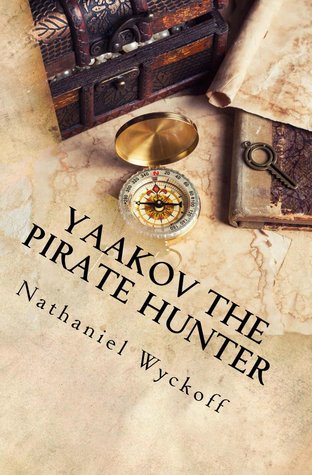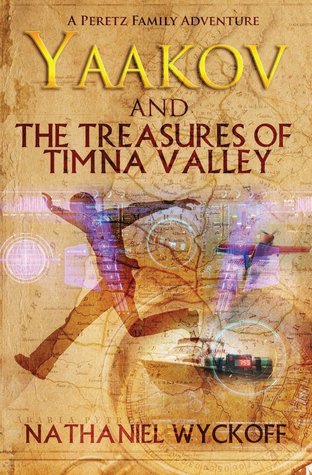Kristi's Book Nook Presents:
Author Nathaniel Wyckoff and is wonderful middle grade read. A perfect book for boys.
Author Bio:
Nathaniel Wyckoff was born and raised in the beautiful San Fernando Valley of southern California. From an early age, he was profoundly interested in reading, writing, telling, and listening to stories. Though he works in a technical field, he counts storytelling among his favorite activities. Nathaniel's storytelling career took flight with the births of his children. His children enjoy all kinds of stories, but most of Nathaniel's stories for them involve zany adventures and confrontations with wacky bullies. Nathaniel's first novel, Yaakov the Pirate Hunter, was inspired by his son's request for a story about robots. It combines elements of science, adventure, and Nathaniel's beloved Jewish tradition. As the Peretz Family Adventures Series continues, Nathaniel's children continue to serve as a source of inspiration.
In addition to writing, the author also enjoys studying his Jewish traditions, reading, playing the accordion and the piano for his family, playing games and sports with his children, and taking his family on hiking trips, camping trips and other adventures.
Meet Nathaniel Wyckoff:
KBN: Why did you choose to write this book?
NW: On
some level, I’ve always wanted to write books, since I’ve so thoroughly enjoyed
reading books since I learned how to do it. It was a dream that kept getting
pushed to the back burner, especially when I chose a technical career for
myself. Anyway, technically minded people are not “supposed to” be creative enough
to write novels. Rubbish, I say.
With
young children of my own, and my happiest moments spent telling them my own
original stories (often invented on the spot), I decided to commit some
original stories to writing. I joined a correspondence course on writing for
children, when our two eldest were very young and our third child was on the
way. “Life” got so busy that I took a break from the course before completing
it. I returned to that course several years later. In the meantime, my kids
were so used to getting stories from me on demand that we thought up a fair
system for story requests on the way to school in the morning. On each day’s
drive to school, it was a different child’s turn to choose the idea for a story
to be told to everyone in the car. One such morning, one of my sons asked me
for a story about a person with ten huge robots. I had a captive audience of three kids in the
car for the next twenty minutes, so I started talking, and the story just kept
flowing and flowing. Eventually, I adapted my son’s original concept to write a
short story for the course that I was taking. Later, that story became my first
novel, Yaakov the Pirate Hunter. In
one sense, the story was a means of escape and adventure. In another sense, it
was simply a way to provide wholesome, engaging literature to my children and
other children.
KBN: Will you be doing any book tours?
NW: I’m
not currently planning any book tours, but I won’t rule out the possibility of
doing so in the future.
KBN: How do you promote literacy?
As
a fairly large family, we have developed a culture of literacy at home. We neither
own nor watch television at home, and we do read a lot of books. Trips to the
public library are anticipated events, and sometimes the returning of books to
the library is used as a motivator for getting things done or behaving
properly. Books and stories are often discussed at home, in addition to being
read. Sometimes our kids have to be torn away from their books when it’s time
to do other things. Reading is seen as an enjoyable activity, just as playing
sports outside or board games.
KBN: What are your thoughts on the new technology for reading a
book?
KBN: What advice do you have for parents on getting their kids’
reading?
NW: Children
value what their parents value, and emulate their parents’ behaviors. Make
literacy an essential and obvious part of your own life. Make reading a fun,
enjoyable, shared activity. Designate a special reading time with your kids
every day, and stick to it. At reading time, either read to your children or
offer them books to read. When you read to them, make the experience fun and
fascinating. Put on silly voices and accents for each character in a story. Ask
your kids questions about what they predict will happen next, or what the
various character’s motivations are. Create a thirst for a story by
capitalizing on the children’s inherent curiosity and sense of wonder.
Incentivize
reading by bringing your kids to the public library and the local bookstore on
a regular basis. Let them make their own choices (subject to your final
approval). Bookstores and libraries often provide incentives to get kids
reading, like summer reading programs with new books as prizes. Libraries often
have story times for younger children. Participate in those activities, and
create positive anticipation for them.
Your
kids also need to understand that you enjoy reading, so be sure that they see
you doing it. When they see Mom and Dad relaxing on the sofa and reading books,
rather than messing with phones or watching a screen, the children learn a
powerful lesson.
To
the extent possible, set up your home in a manner that supports literacy. If
you haven’t yet gotten rid of your television, then at least place it in a back
room somewhere. And keep that thing off for most of the day; you don’t need to
create a constant background noise in your home. Keep bookshelves in the front
of your home, prominently displayed, so that they are among the first features
of your home seen by visitors. Make sure that the kids have shelves lined with their
own books in their bedrooms, as well.
KBN: Why did you choose a family for the adventures in your
story?
NW: I
enjoy taking my own family on “adventures” to explore the world around us.
We have camped, hiked, fished, rafted, and biked down mountain trails together.
We have been to many “out-of-the way” places together, to give our kids a sense
that there is life beyond the urban sprawl in which we live. Fiction offers a
medium to expand those adventures, to take that sense of wonder and exploration
to the next level without worrying about whether you packed enough pairs of
socks. Also, I love the natural sense of security that comes with a family
going out and adventuring; they’re all in it together, no matter what happens,
and will always stick up for each other (even if they bicker incessantly on the
way).
KBN: How long did it take you to get this idea to where it is
now?
NW: It
has been a process of seven years. The concept originated on a drive to school one morning, when my
son asked me to tell his siblings and him a story about a person with ten huge
robots. I came up with a story idea on the spot, and just started telling it.
Later, I adapted my son’s original concept to write a short story about kids
with robots, Yaakov Peretz and his siblings. Since the Peretz kids lived with
their parents, it became a family adventure story. Eventually, at some time in
2010, I turned it into a full-fledged novel, the first edition of Yaakov the Pirate Hunter. At first, I
didn’t know what to do with it. Send it to literary agents? Send it to
publishers? Spend years trying to get “discovered?” A friend introduced me to
digital self-publishing, and another friend (a self-published author)
introduced me to paperback self-publishing. So, I produced the eBook in late
2010 and the paperback in 2011. The process of publicizing the book was
daunting and discouraging for me at the time, and after a short while I let the
book just sit and flounder. Not much in the way of writing or publicity
happened for a time. After several years, an author whom I know encouraged me
to go return to Yaakov the Pirate Hunter and produce a second edition, with
characters a bit more fleshed out and some scenes reworked here and there. I
took her advice, revised the novel, and redesigned its cover. I also managed to
do a better job of getting the word out. Additionally, I couldn’t let myself
leave readers hanging at the end of the novel and wondering what happened next
to the Peretz family. The concept for the sequel bounced around in my mind for
quite some time, and finally I decided to sit down and write. So, now the
Peretzes are old-time family friends.
KBN: What will kids love most about your book(s)?
NW: They
will love a story about pirates that turns the traditional pirate story on its
head. The pirates are the bad guys this time around, and they’re pursued by
smart and daring children. Although the kids’ parents are involved, the kids
themselves do the main detective work and figure out how to foil the adult bad
guys. Kids will also enjoy learning about new technologies, including robots
and other gadgets. They will find it fun to read about seemingly ordinary children,
like themselves, who manage to accomplish extraordinary things by dedicating
themselves to do what’s right. Also, they’ll love the journeys to new and
exciting places, including destinations that may be totally unfamiliar to them.
KBN: What will parents and teachers love most about your book(s)?
NW: Parents
and teachers will love a novel that provides historical, geographical,
scientific, religious, and cultural knowledge in an exciting way. The novel is
not preachy, yet it teaches kids about some of the things that Jewish people do
and value. History is taught through an interesting individual who describes
events and “brings home” those events to a current situation that the
characters face. The novel involves the pursuit of an item with both historical
and cultural value, so kids will learn about life in another culture. Yaakov the Pirate Hunter and its sequel,
Yaakov and the Treasures of Timna Valley,
expose kids to a broad base of knowledge while providing them with exciting
stories. Both books will enhance children’s love of reading and learning.
A review and book giveaway are coming soon for Nathaniel's latest book:




Comments
Post a Comment
Be an advocate for literacy. Thanks for your support and for stopping by.